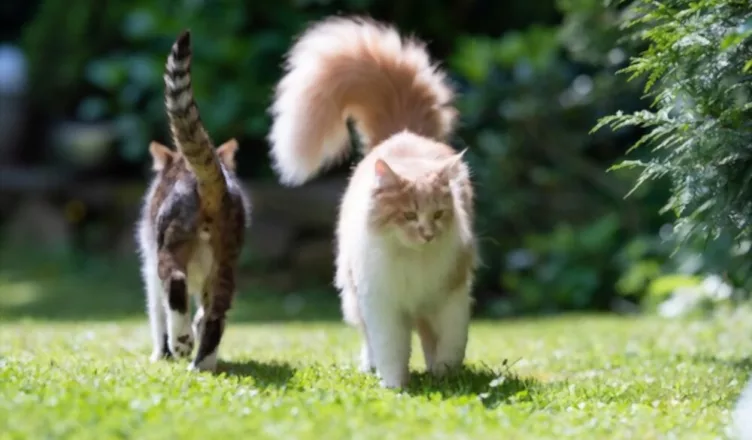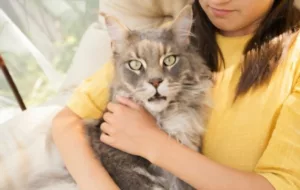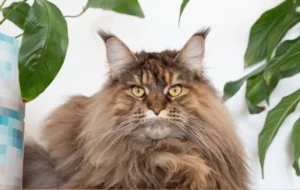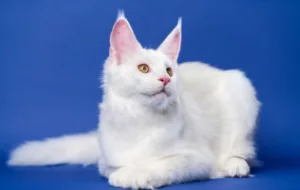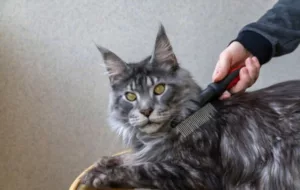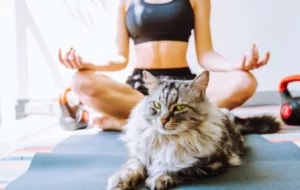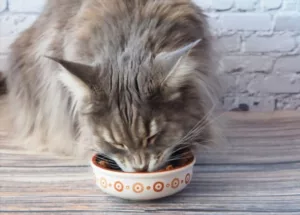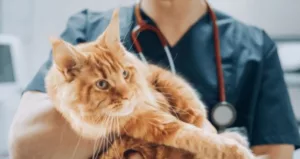As a cat lover, you may have encountered the fascinating debate between the Maine Coon vs. Normal Cat. The Maine Coon is a popular and captivating breed, known for its large size and striking appearance. However, how does it truly compare to a regular domestic cat?
This article will delve into the key differences between Maine Coons and regular cats. Comparing size, physical features, temperament, and care requirements.
Maine Coon Size Compared to Normal Cat
One of the most apparent differences between Maine Coon size and normal cat size. Maine Coons is one of the largest domestic cat breed, with male average cat weighing between 13 and 18 pounds and female between 8 and 12 pounds.
In contrast, the average domestic cat weighs between 5 and 10 pounds, with males generally being heavier than females. The length of a Maine Coon Cats can also be significantly greater than that of regular cats.
A fully grown Maine Coon can measure up to 40 inches in length from the tip of their nose to the tip of their tail, while a regular cat typically measures around 18 inches.
Physical Features: Maine Coon vs. Regular Cat
The physical appearance of a Maine Coon cat breed is quite distinct from a normal cat. Maine Coons have long, rectangular bodies, strong muscular legs, and large paws equipped with tufts of fur.
These features enable them to navigate snowy environments, as they were initially bred in the harsh climates of New England. In contrast, the physical characteristics of a normal domestic cat can vary greatly depending on the specific breed or mix.
However, their body shape is generally more compact, and they have smaller paws. One of the most striking features of a Maine Coon breed is its luxurious fur. They have a double coat, with a soft, downy undercoat and a longer, water-repellent topcoat.
This coat is designed to keep them warm and dry in cold weather. Regular cats can have various coat types, but they generally have a single coat of fur.
Maine Coon Eyes vs. Normal Cat
Maine Coons are known for their large, expressive eyes, which are usually almond-shaped and set at a slightly oblique angle. The eyes of a Maine Coon can come in various colors, including green, gold, copper, or even blue.
The enchanting gaze of a Maine Coon is often described as one of its most captivating features. Other cats also have a variety of eye shapes and colors, but they tend to be smaller and less expressive than those of a Maine Coon.
The eye color of a regular cat is often related to its coat color or pattern, with certain combinations being more common in specific breeds.
Temperament: Maine Coon vs. Normal Cat
Beyond physical differences, the temperament of a Maine Coon is another aspect that sets them apart from regular cats. Maine Coons are known for their friendly, social, and affectionate nature. They are often referred to as “gentle giants” due to their size and amiable disposition.
Maine Coons are also intelligent and can be trained to perform tricks, play fetch, or even walk on a leash. Normal cat breed also exhibits a wide range of personalities, but they tend to be more independent and less likely to engage in activities such as fetch or leash-walking.
Some cat breeds are known for their sociability, while others are more reserved. The bond between a cat and its owner is unique and can vary depending on the individual cat’s personality and history.
Care Requirements: Maine Coon vs Normal Cat
Some general requirements of caring for Maine Coons and regular cats are as given below.
1. Feeding
2. Grooming
3. Providing a clean and safe environment.
But there are also some differences in their care needs due to their distinct characteristics.
Grooming
With their luxurious double coat, Maine Coons require more grooming than most regular cats. It’s essential to brush your Maine Coon at least once or twice a week to prevent matting and remove loose hair.
This will also help to distribute the natural oils on their skin, keeping their coat healthy and shiny. Some Maine Coons enjoy being groomed, while others may need some gentle encouragement.
Regular cats, depending on their coat type, may need less frequent grooming. Short-haired cats can be groomed once a week, while long-haired cats may require brushing every two to three days.
Regular grooming is essential for both Maine Coons and normal cats to prevent hairballs, as cats tend to ingest hair while grooming themselves.
Exercise and Enrichment
Maine Coons are generally more active and playful than the average domestic cat. They enjoy climbing, exploring, and playing games such as fetch. Providing your Maine Coon with an environment that offers opportunities for exercise and mental stimulation is crucial.
Maine Coon toys like cat trees, scratching posts, and interactive toys are excellent additions to your home to keep your majestic feline engaged and physically fit. Other cat breeds also need exercise and mental stimulation, though their activity levels may vary depending on their breed, age, and individual personality.
Providing a variety of toys and opportunities for play will help to keep your normal cat healthy and happy.
Nutrition
Both Maine Coons and regular cats require a balanced diet to maintain their health. However, due to their larger size, Maine Coons may require more food than a regular cat.
It’s essential to consult with your veterinarian to determine the appropriate amount and type of food for your specific cat, as their nutritional needs can vary based on factors such as age, weight, and activity level.
Health Concerns
Maine Coons are generally a healthy breed, but they are prone to certain genetic health issues, such as hip dysplasia, spinal muscular atrophy, and hypertrophic cardiomyopathy. Regular veterinary check-ups are essential to monitor your Maine Coon’s health and to catch any potential issues early.
Regular cats can also be susceptible to various health problems, depending on their breed or genetic background. Common issues include dental disease, obesity, and kidney disease. Ensuring your cat receives regular veterinary care and maintaining a healthy lifestyle will help to prevent many health problems.
Socialization and Training
Maine Coons are known for their sociable nature, and early socialization is essential to ensure they grow up to be well-adjusted adults. Exposing your Maine Coon kitten to various people, animals, and environments can help to prevent fear or aggression later in life.
While regular cats may be more independent, socialization is still crucial for their well-being. Regular cats can also benefit from basic training, such as learning to use a scratching post or coming when called.
Last Words
The Maine Coon and the normal domestic cat have many differences, from size and physical features to temperament and care requirements. Maine Coons are large, striking cats with luxurious coats, expressive eyes, and friendly personalities.
In contrast, normal cat breeds come in a variety of shapes, sizes, and temperaments, offering a unique experience for every cat owner. Both types of feline companions have their own charm and require tailored care to ensure their health and happiness. Regardless of your choice, these feline friends can provide a lifetime of love and companionship.
